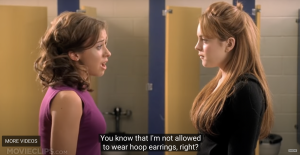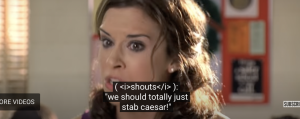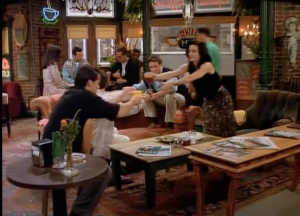Analysis of Jessica Testa’s “How Not to Be a Character in a ‘Bad Fashion Movie’”

NY Times writer Jessica Testa’s “How Not to Be a Character in a ‘Bad Fashion Movie’” is an interview with Laura Brown, who recently lost her job as editor-in-chief at InStyle Magazine. Though many might expect Brown to grieve her job and express sadness at her loss, she took a different approach. Testa describes Brown as a “court jester”, and Brown is true to this: she reflects on her situation and past with the fashion industry with humor. Testa describes the term “‘bad fashion movie’ — a phrase [Brown] began using several years ago to describe the fashion editor archetype: elitist, egomaniacal and downright ‘Devil Wears Prada’-ish.” Describing the members of the fashion industry as members of a “bad fashion movie” highlights Brown’s issues with the fashion industry in a comedic light. The reference to “Devil Wears Prada” connotes exclusiveness and competitiveness. Brown pokes fun at the “fashion editor archetype” that is “elitist” and “egomaniacal”, saying they belong in a “bad fashion movie”, because Brown has realized that the cut-throat pretentiousness of the fashion industry is more akin to the drama of a film than a conducive working environment. Essentially, instead of lamenting her loss, Brown talks about the fashion industry in a humorous light. According to “Managing Emotions in Public: The Case of Wheelchair Users”, an article that explores how wheelchair manage their emotions to conduct successful social interactions: “laughing at or joking about embarrassing events reduces their seriousness and thereby lessens potentially embarrassing concern about them. Laughter and humor are also means of allaying anxiety (Cahill and Eggleston, 4-5,1994). Here, Brown employs a similar strategy to the wheelchair users. Losing one’s job can be an embarrassing experience, but most do not want to present themselves self-consciously in an interview. Thus, Brown uses humor to manage her emotions to display confidence and personability. This persuades us that Brown is better off without her job.
Testa describes Brown as the “furthest a mainstream fashion editor could get from Miranda Priestly’s ilk” who wears “sunglasses” and “beachy waves”. In appearance, Brown differs from her peers, but this separation also originates from differences in personality and values. Brown describes herself as a “nice lady who eats spaghetti”, not one of the “pointy people”. Similar to a “bad fashion movie”, “pointy people” refers to “a certain kind of fashion person: exclusionary, intimidating, obsessed with punching a ‘sandwich card of chic’”. A “sandwich card of chic” is a humorous turn of phrase that indicates Brown is aware that her peers chase after style only to prove they are “chic”, rather than having original style. There is a separation between Brown and her peers. She could have addressed it with anger or insecurity, and that would have affected our perception of her. Brown, however, expresses it with humor which builds an intelligent, confident perception of Brown. Brown manages her emotions to produce a desired display.
Brown’s critical, lacerating analysis of her peers causes us to think she’s better off without her job. Brown reflects on her situation in a comedic yet serious way that perfectly sums up her mindset: “So maybe I’ll get fewer handbags sent to me. [But] if you’ve earned your stripes and done the work, you take it with you. You don’t just fly off into space.”
Analysis of David Brooks’s “Confessions of a Middle-Aged Fanboy”

NY Times writer David Brooks’s “Confessions of a Middle-Aged Fanboy” is a funny analysis into the perspective of an underrepresented population: middle-aged men obsessed with current music. Brooks refers to this as a “condition”: “maturity interruptus”. Essentially, Brooks owns that his musical taste does not fit his age. He uses the term “condition” to acknowledge that many may see this as an issue, that may be inappropriate or weird for an older man to so deeply align with music for teenagers. His awareness of the absurdity of his situation results in many humorous lines to further describe his “condition”. For example, in the 1990s, while Brooks’ hands “were writing and editing conservative editorials for The Wall Street Journal; [his] ears were straight outta Compton.” Here, Brooks compares how straight-edged his work is to how diverse his musical tastes are. The reader laughs at the image of a Wall Street Journal writer listening to rap. According to “Managing Emotions in Public: The Case of Wheelchair Users”, reflecting on “embarrassing events” with humor “reduces their seriousness and thereby lessens potentially embarrassing concern about them”. Humor is effective in supporting social interactions as it is a means of “allaying anxiety” (Cahill and Eggleston, 4-5,1994). While sharing his musical taste may be considered embarrassing because people may be shocked by it, Brooks uses humor to make light of an embarrassing situation. By acknowledging the weirdness of it, the reader is encouraged to laugh with Brooks rather than at him. Brooks manages his expression of emotions by using humor. The reader might have perceived him as eccentric, but, because of his use of humor, Brooks is perceived as sharp and wise.
Brooks describes the 2000s as “ridiculous. [He] was a suburban guy with a minivan. Why was [he] grooving along as Katy Perry sang “I kissed a girl and I liked it”? Why [is he] continually listening to high school breakup songs when [he is] at an age when[he] can barely remember high school?” Again, Brooks paints an image that is very comedic for the reader. Brooks once again employs humor to manage his emotional display. He appears self-aware rather than self-conscious. Brooks then explores the answers to these questions, to why he is so attached to modern music: “Perhaps it’s because Billy Idol offered subtle observations on the human condition….Perhaps it’s because Destiny’s Child offers an inspiring vision of the beloved community… Perhaps, it’s because Taylor Swift … well … she just gets me: ‘I’m a nightmare dressed like a daydream.’” Here, Brooks shows the wide applicability of lyrics and does it in a comedic way. He communicates the power music has to make its listeners feel seen and recognized. In explaining his obsession with current music, Brooks acknowledges both the humor in his musical taste relative to his age and the universal relatability of the music. Instead of viewing himself with aversion, Brooks looks to his musical taste with humor— he pokes fun at the absurdity of it and espouses why more people might want to be like him. He uses humor to turn self-conscious emotions into ones that are proud. Brooks even turns absurdity on its head, saying that maybe it’s more absurd not to listen to current music: “I used to wonder why I listen to music that describes experiences completely irrelevant to my actual life. Unlike 50 Cent, you rarely find me in the club, bottle full of bub. But maybe that’s a feature, not a bug. Escapism seems like a mindless waste of time until you open the newspaper and consider the alternative.”
Analysis of Joyce Walder’s “Farewell, My Lovely Inheritance”

NY Times writer Joyce Walder’s “Farewell, My Lovely Inheritance” is a self-lacerating read that explores the human struggle of grappling with the oncoming death of a loved one. Walder discusses her feelings towards her mother’s death: pain because of her mother’s worsening self-loathing because she fixates on the inheritance she will receive, self-loathing as she laments the loss of funds due to her mother’s extensive care. Walder describes her plan to “erect a monument that will equal the Taj Mahal in terms of loss and despair” in order to secure her inheritance: “The size of a birdhouse, I’m thinking. Not just any birdhouse, a birdhouse for old, infirm birdies, with a special area for art therapy and birdie bingo.” She discusses that she does not have enough funds for a larger monument than a birdhouse. Walder is funny in multiple avenues. We laugh because she acknowledges her struggle to demonstrate her grief for her mother in the most extravagant way but she lacks the capacity to do so in more forms than providing “a special area” in the bird house. We laugh because she is aware that she does not do this out of sole love for her mother but also greed: “Goddamn it, I wanted that money.” Greed can result in an emotional display that is unlikable and alienating, but Walder uses humor to present her darker emotions in a way that is self-aware and relatable. Thus, using humor, Walder turns potential alienation into an avenue to connect with others. In “Managing Emotions in Public: The Case of Wheelchair Users”, humor “reduces their seriousness and thereby lessens …concern about them”. Walder thus “reduces” the “seriousness” of her grief and greed, and the reader is lulled into thinking them lighter topics (Cahill and Eggleston, 4-5,1994). Instead of perceiving Walder as evil or unlikeable, the reader perceives Walder to be self-aware and personable because of the outward display of confidence her humor produces.. Walder owns the darkness in her personal desires: “I know. I know. It’s appalling to be thinking about an inheritance….I have an urgent P.M. from my Better Self: As ever, you disgust me. This is our mother’s one precious life.”. Her acknowledgment of the reader’s potential perspective of her desires is comedic and displays the complexity of human experience: the competing desires of love and greed and ending prolonged pain. Walder reflects on her experience humorously as another avenue to process her feelings: instead of feeling self-revulsion, she can feel grounded in reflecting on the many sides of herself. Walder’s humor is effective in managing Walder’s emotions and outward display such that the reader likes her, despite the ambiguity of her morals. Walder sums up the complexity of her situation: “Then I go home and write the checks and think what a good daughter is never supposed to think: Farewell, my lovely inheritance.”



















